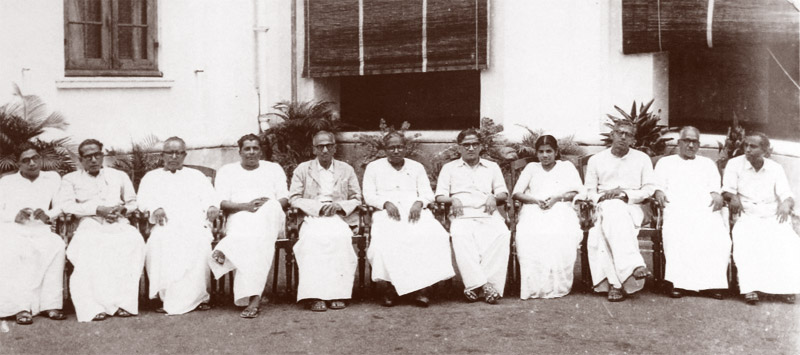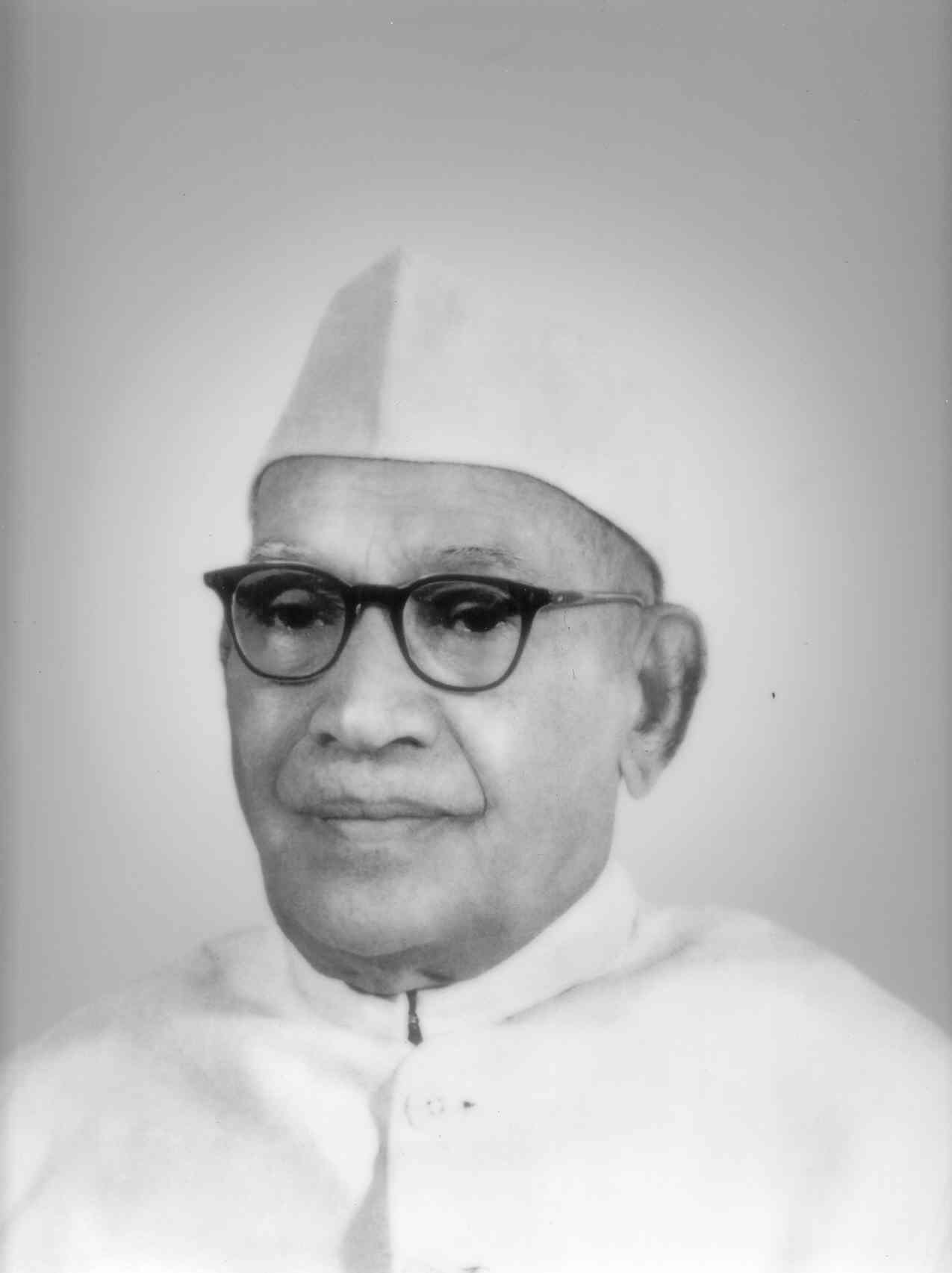|
Third E. K. Nayanar Ministry
The Tenth Kerala Legislative Assembly Council of Ministers, third E. K. Nayanar ministry, was a Kerala Council of Ministers (Kerala Cabinet), the executive wing of Kerala Government of Kerala, state government, led by Communist Party of India (Marxist), CPI (M) leader E. K. Nayanar from May 1996 to May 2001. It had sixteen ministries and overall twenty ministers. The Kerala Council of Ministers, during Nayanar's third term as Chief Minister of Kerala, consisted of: Ministers Trivia This was the third and last term of E. K. Nayanar as the Chief Minister, and the only one in which he completed a full term as chief minister. He did not contest in the 1996 Legislative elections, and V. S. Achuthanandan, another senior Communist leader, was designated as the Chief Minister candidate. When the election results came, the Left Democratic Front won the majority of seats, but Achuthanandan lost. In this special situation, a meeting was held by the CPI (M), which unanimously supported ... [...More Info...] [...Related Items...] OR: [Wikipedia] [Google] [Baidu] |
Left Democratic Front (Kerala)
The Left Democratic Front (LDF) is an alliance of left-wing political parties led by Communist Party of India (Marxist) in the Indian state of Kerala. It is the current ruling political alliance of Kerala, since 2016. It is one of the two major political alliances in Kerala, the other being Indian National Congress-led United Democratic Front, each of which has been in power alternately for the last four decades. LDF has won the elections to the State Legislature of Kerala in the years 1980, 1987, 1996, 2006, 2016 and had a historic re-election in 2021 where an incumbent government was re-elected for first time in 40 years. LDF has won 6 out of 10 elections since the formation of the alliance in 1980. The alliance consists of CPI(M), CPI and various smaller parties. LDF has been in power in the State Legislature of Kerala under E. K. Nayanar (1980–81, 1987–91, 1996–2001), V. S. Achuthanandan (2006-11), Pinarayi Vijayan (2016–current). E. K. Nayanar served as the ... [...More Info...] [...Related Items...] OR: [Wikipedia] [Google] [Baidu] |
Krishnan Kaniyamparambil
Krishnan Kaniyamparambil (1948 - 12 February 2005) was an Indian politician who was the Minister of Agriculture from 9 June 1997 to 13 May 2001. He was the secretary of the Communist Party of India Legislature Party from 1967 to 1969 in Kerala. Biography He was entering politics in 1965, through the CPI, he was actively involved in political activities early from school days. Later, he became active in the trade union field as well. He had to endure police assault, and also had to undergo imprisonment for a week, in connection with an AISF agitation, in 1968. He became elected to the Kerala Legislative Assembly thrice, in 1987, 1991 and 1996 from Nattika constituency, contesting as CPI candidate. He had served as the Minister for Agriculture from 9 June 1997 to 13 May 2001, in the Ministry headed by Shri. E.K. Nayanar. He had likewise a remarkable stint as the Chairman of the Committee on Government Assurances during 1991- 1996, and the Committee on Estimates from 1996 to 1997 ... [...More Info...] [...Related Items...] OR: [Wikipedia] [Google] [Baidu] |
Cabinets Established In 1996
A cabinet in governing is a group of people with the constitutional or legal task to rule a country or state, or advise a head of state, usually from the executive branch. Their members are known as ministers and secretaries and they are often appointed by either heads of state or government. Cabinets are typically the body responsible for the day-to-day management of the government and response to sudden events, whereas the legislative and judicial branches work in a measured pace, in sessions according to lengthy procedures. The function of a cabinet varies: in some countries, it is a collegiate decision-making body with collective responsibility, while in others it may function either as a purely advisory body or an assisting institution to a decision-making head of state or head of government. In some countries, particularly those that use a parliamentary system (e.g., the United Kingdom), the cabinet collectively decides the government's direction, especially in reg ... [...More Info...] [...Related Items...] OR: [Wikipedia] [Google] [Baidu] |
2001 Disestablishments In India
1 (one, unit, unity) is a number, numeral, and glyph. It is the first and smallest positive integer of the infinite sequence of natural numbers. This fundamental property has led to its unique uses in other fields, ranging from science to sports, where it commonly denotes the first, leading, or top thing in a group. 1 is the unit of counting or measurement, a determiner for singular nouns, and a gender-neutral pronoun. Historically, the representation of 1 evolved from ancient Sumerian and Babylonian symbols to the modern Arabic numeral. In mathematics, 1 is the multiplicative identity, meaning that any number multiplied by 1 equals the same number. 1 is by convention not considered a prime number. In digital technology, 1 represents the "on" state in binary code, the foundation of computing. Philosophically, 1 symbolizes the ultimate reality or source of existence in various traditions. In mathematics The number 1 is the first natural number after 0. Each natural number, ... [...More Info...] [...Related Items...] OR: [Wikipedia] [Google] [Baidu] |
1996 Establishments In Kerala
1996 was designated as: * International Year for the Eradication of Poverty Events January * January 8 – A Zairean cargo plane crashes into a crowded market in the center of the capital city of the Democratic Republic of the Congo, Kinshasa, killing around 300 people. * January 9– 20 – Serious fighting breaks out between Russian soldiers and rebel fighters in Chechnya. * January 11 – Ryutaro Hashimoto, leader of the Liberal Democratic Party, becomes Prime Minister of Japan. * January 13 – Italy's Prime Minister, Lamberto Dini, resigns after the failure of all-party talks to confirm him. New talks are initiated by President Oscar Luigi Scalfaro to form a new government. * January 14 – Jorge Sampaio is elected President of Portugal. * January 16 – President of Sierra Leone Valentine Strasser is deposed by the chief of defence, Julius Maada Bio. Bio promises to restore power following elections scheduled for February. * January 19 ** Th ... [...More Info...] [...Related Items...] OR: [Wikipedia] [Google] [Baidu] |
Kerala Ministries
Kerala Council of Ministers, are elected legislative members, who are appointed as ministers by the Kerala State Governor to form the executive branch of the Government of Kerala. They hold various portfolios as decided by the Chief Minister of Kerala. The Kerala Council of Ministers is headed by the Chief Minister and oversees the work of all ministers. The structure of the Kerala State Government is determined by the Constitution of India (1950). The Keralam Council of Ministers along with the other elected legislative members assemble at the Kerala Legislative Assembly to introduce new drafts of law (otherwise known as bills), discuss them with other elected members of the assembly, revise the drafts for edits if necessary. A bill once finalised is sent to vote on the floor of the house of Kerala Legislative Assembly and if the bill receives the majority vote, it becomes a binding law else it is rejected and the existing law continues. The members of the Legislative Assembl ... [...More Info...] [...Related Items...] OR: [Wikipedia] [Google] [Baidu] |
List Of Chief Ministers Of Kerala
The chief minister of Kerala is the head of government, chief executive of the Indian state of Kerala. ''De facto'' executive authority rests with the Chief Minister (India), chief minister. Following elections to the Kerala Legislative Assembly, the Governor of Kerala, state's governor usually invites the party (or coalition) with a majority of seats to form the chief minister, whose Cabinet (government), council of ministers are Cabinet collective responsibility, collectively responsible to the assembly. Given that he has the confidence of the assembly, the chief minister's term is for five years and is subject to no term limits. Following India's independence from the British Raj in 1947, the states' monarchs of Travancore (തിരുവിതാംകൂർ - Thiruvithāmkōr) and Kingdom of Cochin, Cochin (കൊച്ചി - Kochi) instituted a measure of representative government, headed by a prime minister and his council of ministers. On 1 July 1949 Travancore and Co ... [...More Info...] [...Related Items...] OR: [Wikipedia] [Google] [Baidu] |
Susheela Gopalan
Susheela Gopalan (29 December 1929, at Muhamma, in Alappuzha, Kerala – 19 December 2001, at Thiruvananthapuram, Kerala) was an Indian Communist leader and one of the founding members of the Communist Party of India (Marxist). Life She was elected Member of Parliament thrice, from Ambalappuzha (1967), Alappuzha (1980) and Chirayinkil (1991), and was a Minister in the Government of Kerala for a number of years. Born to the famous kalari A kalari is a gymnasium or training space primarily associated with the martial art of Kalaripayattu. The word ''kalari'' comes from Tamil. In the past, village schools in Tamilnadu, typically run by the traditional astrologer families, were k ... family, Cheerappanchira in Muhamma, she was educated in Alappuzha and Trivandrum and joined the Communist Party. She married A. K. Gopalan in 1952, one of the veterans of the party, whom she had met during his years in hiding. She was 25 years younger than him. She was one of the few wom ... [...More Info...] [...Related Items...] OR: [Wikipedia] [Google] [Baidu] |
Paloli Mohammed Kutty
Paloli Mohammed Kutty (born 11 November 1931) is an Indian politician, social worker, the former Minister for Local Administration in the Government of Kerala and a member of both State and Central Committee of Communist Party of India (Marxist). He was also served as Convenor of Left Democratic Front from 2001 to 2006. He represented the Ponnani constituency in Malappuram district in the Kerala Legislative Assembly from 2006 to 2011. Career Mohammed Kutty was born on 11 November 1931 at Kodur near Malappuram, Kerala. After school education, he became a member of the Communist Party of India in 1951. During the course of a long political career, he has served at different times as Member of District Committee of CPI (M), Palakkad, District Secretary of CPI (M), Malapuram. He actively participated in the farmers movements in Kerala. He also served as State Secretary and President of ''Kerala Karshaka Sangham'', farmers' wing of the CPI (M). He was president, Puzhakkattiri Pan ... [...More Info...] [...Related Items...] OR: [Wikipedia] [Google] [Baidu] |
Baby John
Baby John (25 October 1917 – 27 January 2008) was a senior leader of the Kerala Revolutionary Socialist Party (Baby John). Previously, he was General Secretary of the Revolutionary Socialist Party in India. He was known in the Kerala state political circles as ‘Kerala Kissinger’ for his abilities to manage political crises at times when the state was passing through difficult political phases, with reference to Henry Kissinger, an American diplomat and an advocate of a pragmatic approach to geopolitics. Legislative career Baby's legislative career began in the early 1950s, when he was elected to the Travancore-Cochin Assembly. After the formation of Kerala state, he was elected to the Kerala Legislative Assembly from 1960 to 1996, mostly from his home constituency Chavara Chavara is a village in Karunagappally taluk, Kollam district, Kerala, India. It is a part of Kollam Lok Sabha constituency. Location and tourism Chavara is situated on the shores of the Ara ... [...More Info...] [...Related Items...] OR: [Wikipedia] [Google] [Baidu] |
Majority Government
A majority government is a government by one or more governing parties that hold an absolute majority of seats in a legislature. Such a government can consist of one party that holds a majority on its own, or be a coalition government of multiple parties. This is as opposed to a minority government, where the government doesn't have a majority, and needs to cooperate with opposition parties to get legislation passed. A government majority determines the balance of power. A government is not a majority government if it only has a majority when counting parties outside the government that have a confidence agreement with it. A majority government is usually assured of having its legislation passed and rarely if ever, has to fear being defeated in parliament, a state also known as a working majority. In contrast, a minority government must constantly bargain for support from other parties in order to pass legislation and avoid being defeated on motions of no confidence. Single- ... [...More Info...] [...Related Items...] OR: [Wikipedia] [Google] [Baidu] |




